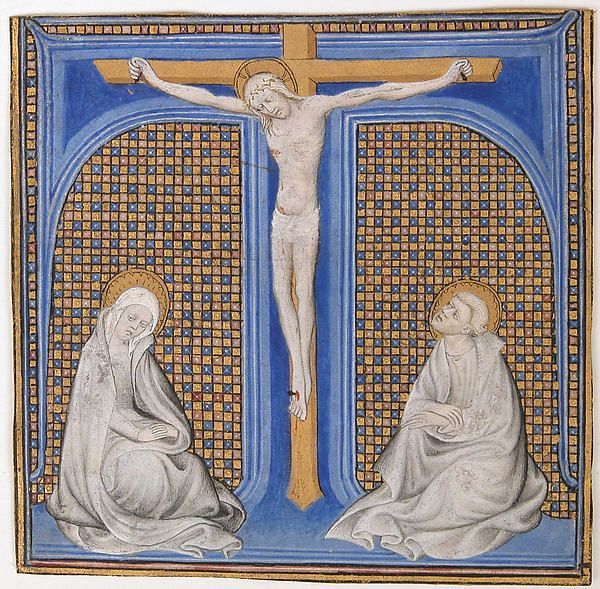The Three Sins
Prayer: In the preparatory prayer I will beg God our Lord for grace that all my intentions, actions, and operations may be directed purely to the praise and service of his Divine Majesty.
First Prelude: a mental image. Here in the meditation of sin, the representation will be to see in imagination my soul as a prisoner in this corruptible body, and to consider my whole being, body and soul, as an exile here on earth.
Second Prelude: I will ask God our lord for what I want and desire. In this meditation is: shame and confusion, because I see how many have been lost on account of a single mortal sin, and how many times I have deserved eternal damnation for the many sins I have committed.
This meditation is divided in three points: the sin of the angels (1), the sin of our first parents (2), the sin of a person who is condemned to hell for committing one mortal sin (3).
- The sin of the Angels (Cf. Rev. 12: 7-9; Mt 25: 41)
a) Angels are immortal and are pure spirits. And they have the highest intellectual power among creatures, in such a way that some had mistakenly believed, that they could equal the perfection of God.
b) Their number is without measure. “Then I looked, and I heard around the throne and the living creatures and the elders the voice of many angels, numbering myriads of myriads and thousands of thousands.”(Rev. 5: 11)
c) Their power is extraordinary. Just in one night the angel of God killed the first-born in Egypt. “At midnight the [angel of the] LORD smote all the first-born in the land of Egypt, from the first-born of Pharaoh who sat on his throne to the first-born of the captive who was in the prison, and all the first-born of the cattle.” (Ex 12: 29) Only one angel killed 180.000 of the army of Sennacherib, to deliver Jerusalem from his power. (Sirach 48: 21) “The Lord smote the camp of the Assyrians, and his angel wiped them out.”
d) Their beauty and majesty mistake them with God Himself. Saint John expresses this, “I, John, am he who heard and saw these things. And when I heard and saw them, I fell down to worship at the feet of the angel who showed them to me.”(Rev 22: 8) Tobit fell upon his face when he saw the angel Raphael. (Tobit 12: 16)
But a third part of them were condemned to hell eternally because they followed Lucifer. Their sin was one of pride. They refused subjection to God.
And God did not spare them. Saint Peter says, “God did not spare the angels when they sinned, but cast them into hell.” (2 Peter 2: 4)
Also, they were deprived of all knowledge that comes from grace. Their will became obstinate in evil.
What happened with all their beauty, what happened with all their wisdom, what happened with all their power. Everything lost, at once.
Looking at the sin of the angel Saint Ignatius asks me to reflect over me saying, angels went to hell for one sin and how many times I have deserved to be condemned for ever because of my numerous sins.
- The sin of our parents (Cf. Gen 3,1-19.)
Great knowledge: Adam and Eve had great knowledge poured into their minds by God.
Control of the passions by reason: passions are emotions in the soul: such as anger, fear, hatred, desire, joy, and sorrow. Adam and Eve would not become angry unless they wanted to. They would never be afraid of anything unless they wanted to.
Freedom from suffering and death: there would be no sickness, weakness, weariness, or bodily discomfort.
Dominion over the created world: God blessed them, and God said to them, “have dominion over … every living thing that moves upon the earth.” (Gen 1: 28-29)
Friends of God: they could speak with God. They could hear the sound of the LORD God moving about in the garden at the breezy time of the day.
But in their foolishness and selfishness man and woman, Adam and Eve, considered that they had no need of God. They thought they could be “gods” by themselves and disobeyed the Lord’s commandment.
“Except the tree of knowledge of good and bad. From that tree you shall not eat; the moment you eat from it you are surely doomed to die.” (Gn. 2: 17)
However, they did it. And God called man, and said to him, “Where are you?”
He had given more than a proof of such a love, when he asked to our first parents Adam and Eve: Where are you? In this question we can see the wounded love of Our Heavenly Father. Also and above all, in this question we can see the “grief” of God for all what sin means for us, to humanity.
Where are you? How far you are. Sin put man into an infinite distance from God. When man sinned, he hid himself from the presence of God.
After sin, in nature something became broken. It was the break-down, the collapse between body and spirit; between parents and children; between brothers, between societies, between nations, and so forth, but worst of all, it was the rupture between the creature and the Creator.
The human beings lost the original unity and harmony in which they were created. That had produced a disorder of cosmic reach, since the whole of the universe lost balance, breaking bonds with its foundation, which is God, the Creator. All these things, just for one mortal sin.
We cannot forget that one mortal sin, only one, deserves for us eternal damnation. Although sin is something temporal, something that happens in just a moment, sin is above all, a free and voluntary action against God (or against his law) and God is eternal. Consequently, the offense is eternal, and the punishment is eternal.
“Why did you do such a thing?” God asks this to Adam and Eve.
Their answer was too much less than sufficient. Adam’s answer was: (Gen. 3: 12 ss) “The woman whom you put here with me, she gave me fruit from the tree, so I ate it,” and in turn Eve said: “The serpent tricked me into it, so I ate it.” Two answers that put together could not convince the poorest jury we could find today anywhere in the world. How could they convince their very Creator? Both of them were trying to blame some other one while they were, obviously, absolutely guilty. Nobody does what he or she does not want to do. Sin is not a mistake, sin is not an error. Sin is a free and volunteer action against God’s law by which a person denies the very life of the spirit, for as says the apostle James says: “Then desire conceives and brings forth sin, and when sin is committed, it gives birth to death.” (1: 15)
“Why did you do such a thing?” Behold the consequences, consequences that will touch all your sons and daughters.
Because of the sin of our first parents, man is conceived without the state of grace.
Because of their sin, man no longer has control of his desires. The harmony in which they had found themselves, thanks to original justice, is now destroyed: the control of the soul’s spiritual faculties over the body is shattered.
Because of the original sin harmony with creation is broken: visible creation has become alien and hostile to man.
Finally, the consequence explicitly foretold for this disobedience will come true: man will “return to the ground,” for out of it he was taken. Death makes its entrance into human history.
We can imagine, the experience of the very first death, the death of Abel. How Eve had tried to awake his wounded son. But nothing, death had appeared for the very first time and would continue showing up.
Looking at our first parents, Saint Ignatius asks me to reflect on myself saying, they deserved all these consequences for one sin, and how many times I have deserved more because of my numerous sins.
- A person condemned to hell for one mortal sin (Cf. Mt 25,41-46)
Saint Ignatius says, consider also countless others who have been lost for fewer sins than I have committed.
Is it possible, to be condemned for just one mortal sin?
Yes, because mortal sin destroys charity in the heart of man by a grave violation of God’s law.
Yes, because mortal means full knowledge and complete consent. It presupposes knowledge of the sinful character of the act, of its opposition to God’s law.
In the psychology of the sinner, we can see that he would like for ever, if it were possible, this moment, because of this if God calls this person at that moment, he receives what he wants, which is to be eternally separated from God. Because where sin is God is not.
Mortal sin deprives us of communion with God. Therefore, it makes us incapable of eternal life and the privation of this life is called ‘eternal punishment’.
Looking at this person, old or very young, who died after his first mortal sin, Saint Ignatius asks me to reflect on myself saying, he deserved eternal punishment for one sin, and how many times have I deserved to be condemned for ever because of my numerous sins.
COLLOQUY
Imagine Christ our Lord before you, hanging upon the cross, and begin to speak with Him of how, being the Creator He then became man, and how, possessing eternal life, He submitted to temporal death to die for my sins.
Then I shall meditate upon myself and ask:
-What have I done for Christ?
-What am I now doing for Christ?
-What ought I do for Christ?
The colloquy is made properly by speaking as one friend speaks to another, or as a servant speaks to his master, now asking some favor, now accusing oneself for some misdeed, or again, making known his trials to Him and seeking His advice concerning them.
Conclude with the ‘Our Father.’

Take, Lord,
and receive all my liberty, my memory, my understanding, and my entire will, all that I have and possess. Thou hast given all to me. To Thee, O Lord, I return it. All is Thine, dispose of it wholly according to Thy will. Give me Thy love and Thy grace, for this is sufficient for me.
(Spiritual Exercises #234. Louis Puhl SJ, Translation.)



